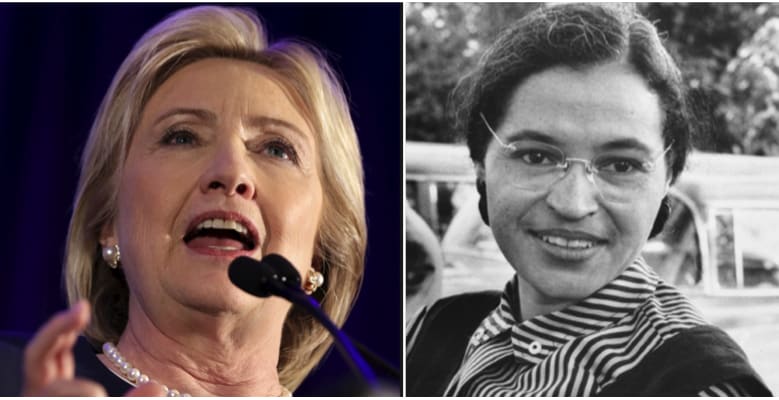
Clinton hyllar Rosa Parks bussaktion på årsdagen
På dagen 60 år sedan Rosa Parks vägrade lämna sin plats på bussen för en vit person i Montgomery, Alabama, hyllas hon av Demokraternas presidentkandidat Hillary Clinton.
Hennes aktion betraktas som en viktig gnista för medborgarrättsrörelsen i USA och ett år senare förbjöd landets högsta domstol segregation på allmänna transportmedel.
Clinton uppmärksammar dagen genom att hålla ett tal i den baptistkyrka i Alabama där pastorn och medborgarrättskämpen Martin Luther King höll sina söndagsgudstjänster mellan 1954 och 1960.
bakgrund
Rosa Parks
Wikipedia (sv)
Rosa Louise McCauley Parks, född 4 februari 1913 i Tuskegee, Alabama, död 24 oktober 2005 i Detroit, Michigan, var en afroamerikansk medborgarrättskämpe. Hon var utbildad sömmerska. Parks tilldelades två av USA:s finaste civila utmärkelser: Frihetsmedaljen 1996 och den amerikanska kongressens guldmedalj 1999.
Parks blev känd för att hon 1955 vägrade lämna sin sittplats i en buss till en vit man, vilket busschauffören krävde att hon skulle göra. Den dåvarande lagen föreskrev att svarta skulle lämna sin sittplats för vita. Händelsen utlöste Bussbojkotten i Montgomery som brukar ses som starten för den moderna amerikanska medborgarrättsrörelsen. Under 1950-talet arbetade Parks som sekreterare och ungdomsrådgivare i NAACP, National Association for the Advancement of Colored People.
bakgrund
Medborgarrättsrörelsen
Wikipedia (en)
The Civil Rights Movement or 1960s Civil Rights Movement, sometimes anachronistically referred to as the "African-American Civil Rights Movement" although the term "African American" was not used in the 1960s, encompasses social movements in the United States whose goals were to end racial segregation and discrimination against African Americans and to secure legal recognition and federal protection of the citizenship rights enumerated in the Constitution and federal law. This article covers the phase of the movement between 1954 and 1968, particularly in the South. The leadership was African-American, much of the political and financial support came from labor unions (led by Walter Reuther), major religious denominations, and prominent white politicians such as Hubert Humphrey and Lyndon B. Johnson.
The movement was characterized by major campaigns of civil resistance. Between 1955 and 1968, acts of nonviolent protest and civil disobedience produced crisis situations and productive dialogues between activists and government authorities. Federal, state, and local governments, businesses, and communities often had to respond immediately to these situations that highlighted the inequities faced by African Americans. Forms of protest and/or civil disobedience included boycotts such as the successful Montgomery Bus Boycott (1955–56) in Alabama; "sit-ins" such as the influential Greensboro sit-ins (1960) in North Carolina; marches, such as the Selma to Montgomery marches (1965) in Alabama; and a wide range of other nonviolent activities.
Noted legislative achievements during this phase of the Civil Rights Movement were passage of the Civil Rights Act of 1964, which banned discrimination based on race, color, religion, sex, or national origin in employment practices and ended unequal application of voter registration requirements and racial segregation in schools, at the workplace, and by public accommodations; the Voting Rights Act of 1965, which restored and protected voting rights; the Immigration and Nationality Services Act of 1965, which dramatically opened entry to the U.S. to immigrants other than traditional Northern European and Germanic groups; and the Fair Housing Act of 1968, which banned discrimination in the sale or rental of housing. African Americans re-entered politics in the South, and across the country young people were inspired to take action.
A wave of inner city riots in black communities from 1964 through 1970 undercut support from the white community. The emergence of the Black Power movement, which lasted from about 1966 to 1975, challenged the established black leadership for its cooperative attitude and its nonviolence, and instead demanded political and economic self-sufficiency.
Many popular representations of the movement are centered on the leadership and philosophy of Martin Luther King, Jr., who won the 1964 Nobel Peace Prize for his role in the movement; however, some scholars note that the movement was too diverse to be credited to one person, organization, or strategy.
Omni är politiskt obundna och oberoende. Vi strävar efter att ge fler perspektiv på nyheterna. Har du frågor eller synpunkter kring vår rapportering? Kontakta redaktionen



